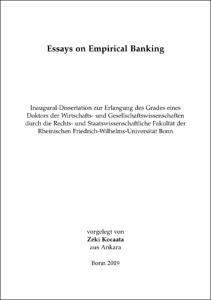Kocaata, Zeki: Essays on Empirical Banking. - Bonn, 2019. - Dissertation, Rheinische Friedrich-Wilhelms-Universität Bonn.
Online-Ausgabe in bonndoc: https://nbn-resolving.org/urn:nbn:de:hbz:5-56624
Online-Ausgabe in bonndoc: https://nbn-resolving.org/urn:nbn:de:hbz:5-56624
@phdthesis{handle:20.500.11811/7768,
urn: https://nbn-resolving.org/urn:nbn:de:hbz:5-56624,
author = {{Zeki Kocaata}},
title = {Essays on Empirical Banking},
school = {Rheinische Friedrich-Wilhelms-Universität Bonn},
year = 2019,
month = nov,
note = {This dissertation comprises of three essays on empirical banking. The first chapter provides a brief introduction to the areas of empirical banking touched upon throughout the dissertation.
Chapter 2 investigates the effects of religiously compliant deposit insurance schemes on deposit supply in six dual banking systems. Using differences-in-differences and triple-differences methodologies, it shows that Islamic banks’ depositors increase their deposit supply after the announcement of a separate Islamic deposit insurance fund. Also, former market discipline vanishes after this announcement. These findings are attributed to the fact that a separate Islamic deposit insurance fund ensures a radical departure from conventional banking, signaling a more “Sharia” compliant Islamic banking system, for which Islamic banks’ depositors ultimately reward. These results demonstrate the trade-off between the availability of funds (deposit supply) and the presence of market discipline for the design of deposit insurance schemes in banking sectors where religious sentiments matter.
Chapter 3 utilizes individual-level data to examine the local effects of bank failures on wage inequality. Exploiting geographical variation in bank failures across communities shows that recent bank failures led to the widening wage gap between skilled and unskilled (skill premium) by around $ 1,000 annually. Additionally, it demonstrates that the type of capital employed in a sector determines the extent to which the effects of bank failures are transmitted to local labor markets. Especially for sectors that use knowledge-dependent capital, which cannot be pledged as collateral and therefore has to be financed internally, skill premium induced by bank failures is differentially higher. These results can unlikely be explained by other confounding factors and are consistent with knowledge-dependent capital being financed through forgone earnings of unskilled workers when total financing capacity shrinks.
Finally, Chapter 4 investigates whether banks decrease their branching network following a reduction in the net interest margin. It uses the abandonment of Regulation Q as a regulatory induced funding shock that allowed but not forced banks to pay interest on demand deposits for the first time since 1933. For some banks, the funding shock was more severe as they financed their business to a larger degree with demand deposits, while other banks did so to a much lesser extent. Our results suggest that banks relying on more demand deposits decrease the number of branches they operate with by around 10%. This effect is particularly strong for smaller banks and banks which do engage to a small extent in commercial lending. Further, those banks become less risky even by reducing their geographical expansion. This is achieved by decreasing the number of branches and the number of new loans in areas with lower income.},
url = {https://hdl.handle.net/20.500.11811/7768}
}
urn: https://nbn-resolving.org/urn:nbn:de:hbz:5-56624,
author = {{Zeki Kocaata}},
title = {Essays on Empirical Banking},
school = {Rheinische Friedrich-Wilhelms-Universität Bonn},
year = 2019,
month = nov,
note = {This dissertation comprises of three essays on empirical banking. The first chapter provides a brief introduction to the areas of empirical banking touched upon throughout the dissertation.
Chapter 2 investigates the effects of religiously compliant deposit insurance schemes on deposit supply in six dual banking systems. Using differences-in-differences and triple-differences methodologies, it shows that Islamic banks’ depositors increase their deposit supply after the announcement of a separate Islamic deposit insurance fund. Also, former market discipline vanishes after this announcement. These findings are attributed to the fact that a separate Islamic deposit insurance fund ensures a radical departure from conventional banking, signaling a more “Sharia” compliant Islamic banking system, for which Islamic banks’ depositors ultimately reward. These results demonstrate the trade-off between the availability of funds (deposit supply) and the presence of market discipline for the design of deposit insurance schemes in banking sectors where religious sentiments matter.
Chapter 3 utilizes individual-level data to examine the local effects of bank failures on wage inequality. Exploiting geographical variation in bank failures across communities shows that recent bank failures led to the widening wage gap between skilled and unskilled (skill premium) by around $ 1,000 annually. Additionally, it demonstrates that the type of capital employed in a sector determines the extent to which the effects of bank failures are transmitted to local labor markets. Especially for sectors that use knowledge-dependent capital, which cannot be pledged as collateral and therefore has to be financed internally, skill premium induced by bank failures is differentially higher. These results can unlikely be explained by other confounding factors and are consistent with knowledge-dependent capital being financed through forgone earnings of unskilled workers when total financing capacity shrinks.
Finally, Chapter 4 investigates whether banks decrease their branching network following a reduction in the net interest margin. It uses the abandonment of Regulation Q as a regulatory induced funding shock that allowed but not forced banks to pay interest on demand deposits for the first time since 1933. For some banks, the funding shock was more severe as they financed their business to a larger degree with demand deposits, while other banks did so to a much lesser extent. Our results suggest that banks relying on more demand deposits decrease the number of branches they operate with by around 10%. This effect is particularly strong for smaller banks and banks which do engage to a small extent in commercial lending. Further, those banks become less risky even by reducing their geographical expansion. This is achieved by decreasing the number of branches and the number of new loans in areas with lower income.},
url = {https://hdl.handle.net/20.500.11811/7768}
}






